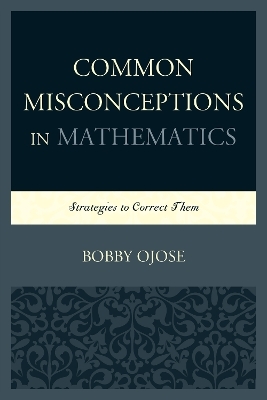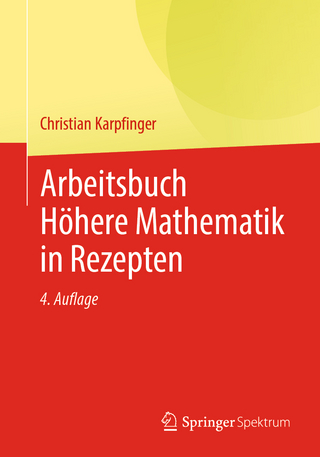
Common Misconceptions in Mathematics
University Press of America (Verlag)
978-0-7618-5885-0 (ISBN)
This book should be a handy tool for teachers of mathematics as they develop plans to confront the problem of misconceptions, which are common with students that often have their own notion of certain mathematical concepts, right or not. The onus is on the teacher to detect those misconceptions and help students remedy them. This book is written for that purpose. Teachers could emulate the presented strategies that the book has elucidated. Teachers may also devise their own strategies based on the source of the misconception as presented in the book. The research segment of each identified misconception will be helpful if teachers want to apprise themselves with what the literature says about the concept. In general, the book is meant for teachers who want to help students engage in mathematics that emphasize conceptual understanding.
Bobby Ojose is an assistant professor of mathematics education at the University of Redlands. He obtained his doctorate in mathematics and science education from the University of Southern California. Dr. Ojose teaches courses in mathematics and science education in the preliminary teaching credential program and the quantitative research methods courses for the MA and doctoral programs. His research agenda is focused on mathematics education.
Introduction
The Purpose of the Book
Issues with Misconceptions
What are Misconceptions in Mathematics?
How do Misconceptions Come About?
Why is it Important to Correct Misconceptions?
Part One: Arithmetic
Misconception 1: Addition Sentence
Misconception 2: Subtracting Whole Numbers
Misconception 3: Addition of Fractions
Misconception 4: Subtraction of Fractions
Misconception 5: Rounding Decimals
Misconception 6: Comparing Decimals
Misconception 7: Multiplying Decimals
Misconception 8: More on Multiplying Decimals
Misconception 9: Division of Decimals
Misconception 10: Percent Problems
Misconception 11: Division by a Fraction
Misconception 12: Ordering Fractions
Misconception 13: Least Common Multiple (LCM)
Misconception 14: Addition of Decimal Numbers
Misconception 15: Subtraction of Integers
Misconception 16: Converting Linear Units
Misconception 17: Power to a Base
Misconception 18: Order of Operations I
Misconception 19: Order of Operations II
Misconception 20: Simplifying Square Roots
Misconception 21: Comparing Negative Numbers
Misconception 22: Addition of Negative Integers
Misconception 23: Scientific Notation
Misconception 24: Proportional Reasoning
Misconception 25: Time Problem
Part Two : Algebra
Misconception 26: Dividing Rational Expressions
Misconception 27: Adding Rational Expressions
Misconception 28: Adding Unlike Terms
Misconception 29: Adding Like Terms
Misconception 30: Distributive Property
Misconception 31: Writing a Variable Expression
Misconception 32: Simplifying a Variable Expression
Misconception 33: Factoring
Misconception 34: Exponents Addition
Misconception 35: Zero Exponents
Misconception 36: Solving Equation by Addition and Subtraction
Misconception 37: Solving Equation by Division and Multiplication
Misconception 38: Fractional Equations
Misconception 39: One-Step Inequality
Misconception 40: Absolute Value
Misconception 41: Operations with Radical Expressions
Misconception 42: Simplifying Polynomials
Misconception 43: Systems of Equations
Conclusion
References
Appendix A: List of Manipulatives and their Uses
Appendix B: Teaching Standards
| Verlagsort | Lanham, MD |
|---|---|
| Sprache | englisch |
| Maße | 155 x 231 mm |
| Gewicht | 236 g |
| Themenwelt | Schulbuch / Wörterbuch |
| Mathematik / Informatik ► Mathematik ► Algebra | |
| Sozialwissenschaften ► Pädagogik | |
| ISBN-10 | 0-7618-5885-7 / 0761858857 |
| ISBN-13 | 978-0-7618-5885-0 / 9780761858850 |
| Zustand | Neuware |
| Informationen gemäß Produktsicherheitsverordnung (GPSR) | |
| Haben Sie eine Frage zum Produkt? |
aus dem Bereich


